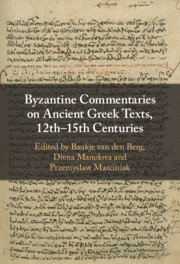Book contents
- Byzantine Commentaries on Ancient Greek Texts, 12th–15th Centuries
- Byzantine Commentaries on Ancient Greek Texts, 12th–15th Centuries
- Copyright page
- Contents
- Contributors
- Introduction Byzantine Commentaries on Ancient Greek Texts
- Chapter 1 The Politics and Practices of Commentary in Komnenian Byzantium
- Chapter 2 Forging Identities between Heaven and Earth
- Chapter 3 Cultural Appropriation and the Performance of Exegesis in John Tzetzes’ Scholia on Aristophanes
- Chapter 4 Uncovering the Literary Sources of John Tzetzes’ Theogony
- Chapter 5 Odysseus the Schedographer
- Chapter 6 Eustathios of Thessalonike on Comedy and Ridicule in Homeric Poetry
- Chapter 7 Geography at School
- Chapter 8 Painting and Polyphony
- Chapter 9 Parodying Antiquity for Pleasure and Learning
- Chapter 10 Teaching Poetry in the Early Palaiologan School
- Chapter 11 Late Byzantine Scholia on the Greek Classics
- Chapter 12 Theodora Raoulaina’s Autograph Codex Vat. gr. 1899 and Aelius Aristides
- Chapter 13 The Reception of Eustathios of Thessalonike’s Parekbolai in Arsenios Apostolis’ and Erasmus’ Paroemiographic Collections
- Index
- References
Chapter 3 - Cultural Appropriation and the Performance of Exegesis in John Tzetzes’ Scholia on Aristophanes
Published online by Cambridge University Press: 07 August 2023
- Byzantine Commentaries on Ancient Greek Texts, 12th–15th Centuries
- Byzantine Commentaries on Ancient Greek Texts, 12th–15th Centuries
- Copyright page
- Contents
- Contributors
- Introduction Byzantine Commentaries on Ancient Greek Texts
- Chapter 1 The Politics and Practices of Commentary in Komnenian Byzantium
- Chapter 2 Forging Identities between Heaven and Earth
- Chapter 3 Cultural Appropriation and the Performance of Exegesis in John Tzetzes’ Scholia on Aristophanes
- Chapter 4 Uncovering the Literary Sources of John Tzetzes’ Theogony
- Chapter 5 Odysseus the Schedographer
- Chapter 6 Eustathios of Thessalonike on Comedy and Ridicule in Homeric Poetry
- Chapter 7 Geography at School
- Chapter 8 Painting and Polyphony
- Chapter 9 Parodying Antiquity for Pleasure and Learning
- Chapter 10 Teaching Poetry in the Early Palaiologan School
- Chapter 11 Late Byzantine Scholia on the Greek Classics
- Chapter 12 Theodora Raoulaina’s Autograph Codex Vat. gr. 1899 and Aelius Aristides
- Chapter 13 The Reception of Eustathios of Thessalonike’s Parekbolai in Arsenios Apostolis’ and Erasmus’ Paroemiographic Collections
- Index
- References
Summary
Taking its cues from John Tzetzes’ commentaries on Aristophanes, this chapter investigates the idea of exegesis as performance. Commenting on texts was far from a disembodied act in Byzantium; on the contrary, it required an effort that was both intellectual and physical. Not unlike today, holding a class was an exercise calling for a series of structured bodily and mental practices to be successful. The first part of this chapter addresses the entanglements between performativity and manuscript production by looking at what Tzetzes’ scholia on Aristophanes tell us about the setting and the execution of the actual exegetical activity. The second part focuses on Commentary on Aristophanes’ Frogs 843a in order to show that appropriation of non-Hellenic traditions played a part in the performative and exegetical engagement with the classics in Constantinople toward the end of the twelfth century.
Keywords
- Type
- Chapter
- Information
- Publisher: Cambridge University PressPrint publication year: 2022
References
- 14
- Cited by

